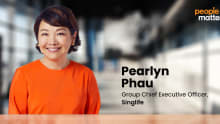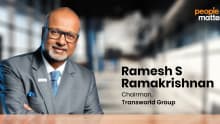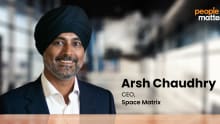In shipping, it's the crew, not the cargo: Transworld Group’s chairman

The global shipping industry is in a state of disarray. Pandemic-induced supply chain disruptions, coupled with geopolitical conflicts impacting key routes like the Red Sea, have created a storm of product delays, price inflation, and a fundamental shift in customer expectations.
As Ramesh S. Ramakrishnan, Chairman of the Dubai-based shipping and logistics group, emphasises, customers are demanding a new standard: diversification across transportation modes, agile distribution networks, and real-time supply chain visibility.
Transworld Group of Companies, a 45-year-old company with offices spanning over 10 regions including India, the Middle East, and the USA, sees opportunities amid this storm to enhance customer value. In this exclusive interview, Ramesh shares the strategies guiding the logistics company.
Here are the edited excerpts.
Mastufa: How do you see the global shipping and logistics scenario today, considering the trends, disruptions, and evolving customer expectations?
Ramesh: Recent events including geopolitical disruptions have exposed vulnerabilities in supply chains, causing delays and inventory issues for clients. While 90% of global trade still relies on ocean shipping, the industry has evolved beyond simple port-to-port transportation. Clients now demand comprehensive solutions, driving the growth of multimodal logistics encompassing rail, warehousing, distribution, and supply chain management.
ALSO READ...
Customer expectations have also shifted. There's a heightened focus on efficiency, just-in-time deliveries, and minimising inventory costs. Specialisation is key to meeting these demands, and experienced companies like ours are creating tailored solutions to address specific client needs.
Mastufa: Given these macroeconomic conditions, how is Transworld Group positioning itself to adapt to these uncertainties?
Ramesh: We've adopted a three-pronged approach to navigate these challenges: focusing on our people, refining our processes, and embracing continuous improvement. Our customers are central to everything we do. We maintain open communication channels, understanding their unique pain points and challenges. This transparent dialogue allows us to tailor solutions to their specific needs, as there's no one-size-fits-all approach in today's dynamic landscape. We collaborate closely with our clients, continuously iterating and refining our solutions to ensure they remain effective in addressing their evolving needs.
Mastufa: Can you tell us more about people and processes? How are you empowering your team in the wake of these challenges?
Ramesh: We firmly believe that our people are our greatest asset. It's not the ships, planes, or computers, but the people who utilise them that truly matter. We prioritise their well-being and empowerment through continuous training, education, and support, fostering a skilled and adaptable workforce. We ensure our employees understand both short-term and long-term objectives, fostering a sense of purpose and direction. Our HR system tracks key performance indicators to keep everyone aligned with the company's vision and motivated. We believe in creating a positive work environment where our employees feel valued and empowered to give their best.
Mastufa: Can you share more on your strategy for training your workforce, especially in light of the rise of AI?
Ramesh: Artificial intelligence (AI) is transforming businesses, so we prioritise continuous training and reskilling with a focus on both technical and soft skills development. Along with training on the latest AI technologies, we train them in problem-solving and critical thinking skills. As AI automates certain tasks, we ensure that our employees are equipped with the skills needed for new roles and responsibilities. While we embrace AI and other emerging technologies, we also recognise the importance of the human element. Technology can enhance efficiency, but it cannot replace human ingenuity and creativity.
Mastufa: AI is raising concerns about job displacement, even as companies struggle to retain top talent. How do you see this paradox?
Ramesh: AI will inevitably displace some jobs if people are unwilling to adapt and reskill. However, it's a two-way street. Both employees and organisations need to work together to ensure that human capital isn't simply discarded. Efficiency is important, but not at the expense of our people.
At Transworld Group, our core values and company culture, nurtured over 48 years, continues to attract individuals who share our values. While we utilise AI to enhance efficiency, we strive for a balance where technology complements, rather than replaces, our workforce. Ultimately, our culture and values are the cornerstone of our approach to talent management.
Mastufa: Let's talk about technologies. While drones, blockchain, and autonomous vehicles are often in the spotlight, what technologies is Transworld Group everaging?
Ramesh: One major issue we identified was the lack of visibility for clients regarding the movement and status of their cargo. To address this, we created a platform that prioritises transparency and real-time tracking. Clients can now access information about their shipments at every stage, from loading at the warehouse to arrival at the final destination. We also implemented robust reporting mechanisms to provide detailed updates on the physical status of cargo within warehouses.
While emerging technologies like drones and autonomous vehicles are gaining traction, their widespread adoption in our industry may take some time. And, we're investing in areas like artificial intelligence, machine learning, and data analytics to automate processes, optimise routes, and predict potential disruptions.
Mastufa: What are some of the promising opportunities you see in the shipping industry today? Are you capitalising on them?
Ramesh: We see many opportunities to enhance customer value. One key area as discussed earlier is on improving visibility and tracking. Another focus is optimising warehouse operations. Efficient management of large distribution centres is crucial, as labour and time costs can quickly add up. We've developed advanced warehouse management systems that utilise technology to streamline processes, intelligently place and retrieve cargo, and minimise errors. We also work with research institutes in India and consult with management firms to identify emerging trends and potential opportunities. It's an ongoing process of innovation and refinement.
Mastufa: What are your top priorities for Transworld Group in 2024?
Ramesh: People: The well-being of our employees, our extended family, is paramount. We're committed to enhancing their welfare and expanding our corporate social responsibility efforts. This means consolidating our philanthropic initiatives to maximise their impact on society, focusing on areas that align with our values.
Planet: We've set an ambitious goal of achieving net-zero carbon emissions by 2043.
Growth: We're investing in significant projects like a state-of-the-art food processing facility in Gujarat and a large distribution centre in partnership with Jafza. These projects will drive job creation and expand our capabilities.
Ethics: We're dedicated to fair and ethical recruitment practices, particularly for blue-collar workers from the subcontinent.
Overall, 2024 promises to be a year of challenges and opportunities. We'll continue exploring new avenues and expanding our capabilities in the logistics space.






